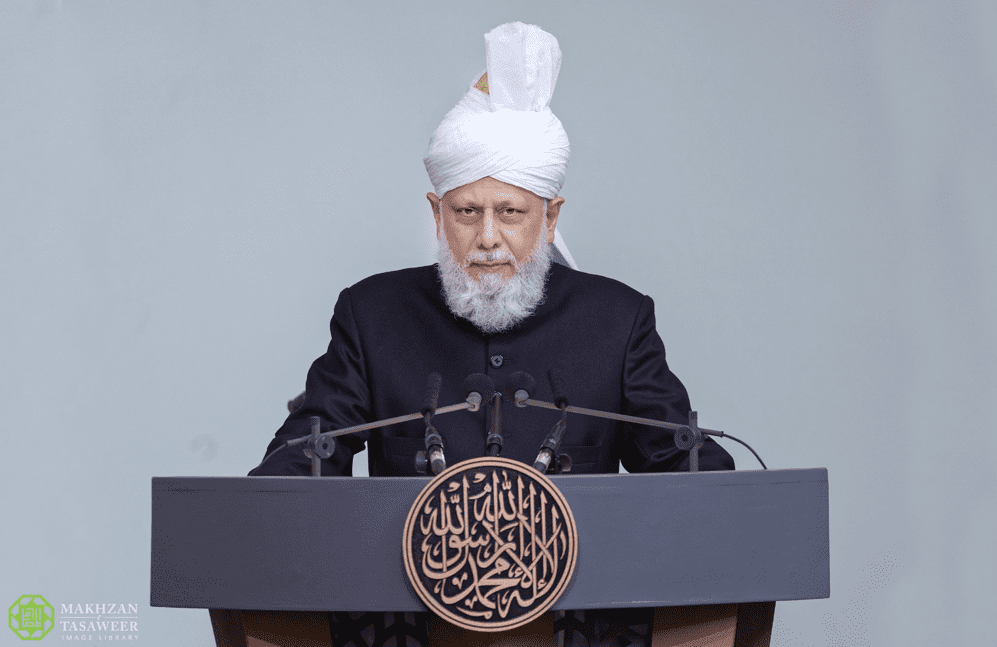Friday Sermon delivered by
Hazrat Mirza Masroor Ahmad(at)
Friday Sermon delivered at Masjid Mubarak, Islamabad, Tilford, UK
Rightly Guided Caliphs – Hazrat Umar(ra) & Launch of the New Ahmadiyya Encyclopedia
After reciting Tashahhud, Ta‘awwuz and Surah al-Fatihah, His Holiness, Hazrat Mirza Masroor Ahmad(aba) said that he would continue highlighting incidents from the life of Hazrat Umar(ra).
His Holiness(aba) said that once, when Hazrat Umar(ra) overcame the Christians and Jewish people of Yemen, he did not take their lands from them, rather he purchased them.
His Holiness(aba) said that in the Holy Qur’an, God Almighty states:
‘You desire the goods of the world, while Allah desires for you the Hereafter.’ (The Holy Qur’an, 8:68)
In light of this verse, His Holiness(aba) said that the Second Caliph(ra) has proven that Islam does not permit making anyone prisoner aside from the time of war. Once a group from Yemen came to Hazrat Umar(ra) and said that they had been made prisoners in their land by the Christians. Hazrat Umar(ra) said that he would investigate, and if this turned out to be true, he would surely free them of this imprisonment.
His Holiness(aba) said that the Second Caliph(ra) compared this to Europe where slavery continued until the 19th century, whereas Islam abolished all such forms of imprisonment and slavery.
Selflessness of Hazrat Umar(ra)
His Holiness(aba) said that once during the era of Hazrat Umar(ra), a famine overcame Madinah and surrounding areas, to the extent that this year was known as the ‘Year of Ashes’. During this time, Hazrat Umar(ra) wrote a letter to the governor of Egypt, Hazrat Amr bin Aas(ra) requesting for help and assistance. Amr bin Aas(ra) responded by saying that he would send an envoy of camels, to the extent that the first camel would be in Madinah and the last camel in the line would still be in Egypt. Similarly, the governor of Iraq and Syria also sent aid. As the aid would reach them, Hazrat Umar(ra) would instruct for it to first be given to those living in villages. Hazrat Umar(ra) would also have food prepared, and an announcement would be made for anyone who needed food to come and take whatever they needed.
His Holiness(aba) said that once some food was presented to Hazrat Umar(ra) which contained some meat. He inquired as to where it had come from and was informed that it was from one of the camels which had been slaughtered. Hazrat Umar(ra) asked what kind of a leader he would be, if he kept the best portion of the food for himself and gave the remaining parts to his followers. Thus he asked for it to be taken away and for something else to be brought to him. It is recorded that Hazrat Umar(ra) did not eat meat or butter until everyone else was properly fed and returned to their normal state. It is recorded that the colour of his skin began to darken because of limited quantities of food he would eat.
His Holiness(aba) said that Hazrat Umar(ra) asked for the number of people who had come to eat should be counted. When counted, it turned out that 7,000 people had come to eat with him, and on another day that number increased to 10,000. This continued until finally, after the prayers of Hazrat Umar(ra), it rained and the famine was over.
Hazrat Umar’s(ra) Exemplary Leadership
His Holiness(aba) said that initially in mosques, prayers would be offered on the ground, as a result of which the foreheads of the worshippers would often be covered in mud. It is recorded that Hazrat Umar(ra) was the first to instruct that prayer mats should be placed on the ground in order to make it easier to pray. It was also during the era of Hazrat Umar(ra) that the Prophet’s Mosque (Masjid Nabawi) was renovated and expanded.
His Holiness(aba) said that it was also during the era of Hazrat Umar(ra) that he initiated taking census from citizens, and it was also during this time that Hazrat Umar(ra) established a rationing system. This was in accordance with the same equality which was established by the Holy Prophet(sa) as soon as he arrived in Madinah. Once during a battle, the Holy Prophet(sa) learned that some people did not have enough to eat, while there were some who had plenty to eat. Seeing this, the Holy Prophet(sa) instructed everyone who had something to eat to gather it, and then it was equally distributed so that everyone could eat. Everyone ate separately until it was possible to do so, but when the risk of some remaining hungry arose, the Holy Prophet(sa) instructed that all should eat equally. His Holiness(aba) said that this was not to establish any sort of socialism or communism, rather it was a decision made based on the circumstances at the time. Hence, this was the example established by the Holy Prophet(sa).
His Holiness(aba) said that it was based on the examples set by the Holy Prophet(sa), that as Islam began spreading far and wide and different nations began joining Islam, that Hazrat Umar(ra) established a system of taking census in order to determine the number of citizens, and then distributing food under a rationing system in order to ensure that all those coming in to the fold of Islam were able to eat. Thus, the Islamic government established a system, whereby the sustenance of every person became the responsibility of the government. It is said that Soviet-Russia was the first to provide for its citizens after taking a census. However it is a proven fact that this concept was first established by Islam and its government.
Establishing the Official System of Shura
His Holiness(aba) said that during the era of Hazrat Umar(ra), countries were divided into provinces in order to help facilitate governance. Similarly, it was during the era of Hazrat Umar(ra) that the system of Shura (consultation) was established. It would be during these consultative meetings that the ministers of different departments and governors of different areas would meet. Hazrat Umar(ra) established certain rules and guidelines for office bearers, to ensure that they did not fall into arrogance or worldliness. It was also during the era of Hazrat Umar(ra) that the taxation was made more lenient so as to make it easier for the citizens to pay.
His Holiness(aba) said that he would continue highlighting the life of Hazrat Umar(ra) in future sermons.
Launch of the New Ahmadiyya Encyclopedia
His Holiness(aba) said that he would be making an announcement regarding the launch of the Ahmadiyya Encyclopedia established by the central Ahmadiyya Archive and Research Center. They began working on this project a little while ago, and now this website is available for the benefit of members. The website being launched is https://www.ahmadipedia.org/ where there is a search engine to easily search material. Search results will include links to various Community websites, and relevant videos etc. There is also an option on this website where people can send in historical accounts which they may have which have not previously been recorded. After verification, these accounts will be included in the website, thus making it a project which will continue with the help of members of the Community. If anyone is unable to find certain material or information on the website, one can contact the central team, and they will work on finding and making that information available. The central IT department as well as the missionaries in the Archive and Research Center played a great role in preparing the material for this website. His Holiness(aba) prayed for all those involved, and said that after the Friday prayer, he would be launching this website.
Summary prepared by The Review of Religions.

